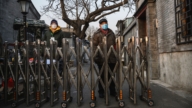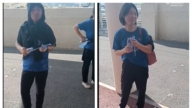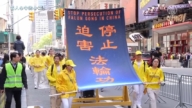【新唐人2013年02月20日讯】最近中国大陆多个省份或地区突然推出新规定,限制查询楼房资料。推出房屋信息查询规范的地方,包括福建漳州、江苏盐城、北京、广州和深圳等地。新规定严禁以人名查询业主,或限定司法部门可以查询。舆论质疑新措施是当局为保护贪官,阻止外界公开官员财产。是反贪腐的大倒退!
2月中旬,福建漳州市出台了《房屋权属登记信息查询暂行办法》。根据这个办法,除申请查询本人房屋信息,或国家公、检、法等机关的协助查询外,严禁以姓名(名称)为条件进行查询,只能以明确的房屋座落,或房屋所有权证编号进行查询,查询工作人员对房屋权属信息的内容保密,严禁查询业主资料。
而江苏盐城市日前也出台《盐城市房屋登记信息查询管理办法(试行)》,对房屋信息实行有条件查询和限制查询。除本人、公检法、住房保障部门、律师等通过一定程序,其他情形“一律严禁以人查房”。办法宣称,部分地区个人住房信息的不正常流出,“引发了部分市民对个人住房信息安全的担忧,社会各界也颇为关注。”
在广州,以前查询产权,只要有房产证编号或房产地址任何一个信息就可以查询,但1月起,需要同时提供房产证编号、地址、登记字号等才可以查询。
北京时政观察人士华颇:“因为现在报出了那么多的房事家族,而且都是普通的公民查索的,常常各级纪委是跟着公民的举报,闹得各级纪委和公安机关都很被动,虽然这样是可以做到真正反腐,但是对执政者来说,并不是什么好事情。所以各地为了遮丑,所以出台了这些所谓的规定吧!就是不能够随便查询公民的财产。”
大陆媒体报导指出,各地的新政策都是以“保障个人私隐”为名,但住建部2006年已出台《房屋权属登记信息查询暂行办法》,明确规定单位和个人可以公开查询楼房资料。
广州维权律师唐荆陵认为,新法规的出台,是为了保护官员,不是为了保护公民的隐私。
广州维权律师唐荆陵:“本来对于普通公民的房产信息的隐私保护,法律上是有一些规则的,可以保证普通公民的隐私不被随意的泄露,但是现在广州以及最新新闻出现的地方法规,对房产信息的保护给予过分严格的规则,就是让民众要查询到官员的房产信息变得十分困难了。所以在程序上应该重在保护地方公民的隐私,而对官员的财产信息持一个相对开放的态度。”
“北京理工大学”教授胡星斗向媒体表示,新措施背后的目地,是阻止一般人公开官员财产,是倒退的做法,是公然对抗中央反腐举措。显示利益集团正在千方百计保护腐败,阻止反贪“打老虎”。
而《中国青年网》也发表评论文章批评,这是对大众的愚弄和污辱,实为“护贼心虚”。
北京宪政学者陈永苗:“权贵官僚集团会把反腐败当作一种维权的表演,看起来觉得他很清廉,实际上反腐败也是他利益最大化——造成他形象很好。许宗衡就是这样子,人家都觉得他很清廉,实际上贪了很多!”
网民也纷纷炮轰查询房产信息新规定是让“贪腐合法化”。
唐荆陵:“因为如果公开说它腐败,那它这政党,我看一天都搞不下去,所以它嘴上也会高调的讲着反腐。所以在舆论上,它必须得迎合民众的舆论,但是在实际意义上它又和民众的意愿相反。”
也有网民担忧,中共新领导层反腐举措可能将“鸣金收兵”!唐荆陵则表示,专制政府需要依靠腐败生存,所以中共政权不可能真正的反腐。他认为,要切实反腐,就必须实行民主、自由和宪政的社会制度。
采访/李韵 编辑/周平 后制/萧宇
New Property Law Angers Mainlanders
Recently, several Mainland China cities swiftly implemented
new measures to limit the search of property ownership data.
They launched measures in specific areas, like Zhangzhou
(Fujian), Yancheng(Jiangsu), Beijing, Guangzhou, Shenzhen.
The new measures ban searching by names of homeowners,
only allowing legal departments to do the searches.
The public thinks these new measures are to protect corrupt
officials and stop people from publicizing officials’ property.
This pulls the “anti-corruption” initiative backward.
In mid-February, Zhangzhou City in Fujian
launched a “housing registration measures.”
It states, only homeowners themselves, the police, the court,
or the legal departments can search for property information.
The new regulation does not allow the public to check
on homeowners’ names and other related data.
The public is only allowed to check property information
by providing the property certificates numbers.
The staff should keep the information confidential,
as it is not allowed to provide information on properties.
Yancheng City in Jiangsu also launched draft measures,
allowing to check property information under a condition.
Search on homeowners’ names is prohibited, except for
the homeowners, police, court, and legal departments, and they have to follow the required procedure,
The measures say, some regions leaked homeowners data,
“causing citizens to worry about their property privacy. These measures drew outsiders’ attention.”
In Guangzhou, in the past, information could be obtained
by providing property certificates number or home address.
Since January, one needs to provide property certificates
number, home address and registration number.
Hua Puo, Beijing Current Affairs Observer: “Many
Homeowners’ data had been exposed by ordinary citizens.
Usually, the Discipline Committee would make a follow up
after citizens expose corrupted officials’ cases.
This made the authorities feel useless.
Although this way real anti-corruption can be achieved,
for the leadership this isn’t good at all.
Thus, in order to cover up the scandals,
each region had launched these so-called measures.
In other words, you can’t casually enquire
for personal property information.”
Media in the Mainland China reported that new measures
are using the excuse of “privacy protection.”
However, a measure issued in 2006, clearly says, workplaces
and individuals can freely search property information.
Tang Jingling, Guangzhou human rights lawyer believes,
the new measures are only to protect officials, not civilians.
Tang Jingling: “Originally, ordinary citizens’
property information was confidential.
This has been written in a law, to ensure citizens’
confidential data must not be casually leaked out.
But now, in Guangzhou, where media is used to spread
the new measures, it means privacy protection gets too strict.
In other words, it makes more difficult for the public
to search officials’ property obtained through corruption.
Thus, the process should concentrate on protection
of local citizens’ privacy.
Regarding officials’ property information,
it should be more open.”
Hu Xingdou, a Professor at Beijing Institute of Technology
spoke to the media on the issue.
The real purpose behind the new measures is to stop people
from publicizing officials’ property, it is a step backwards.
This is an open resistance against the central government’s
anti-corruption initiatives, thinks Prof. Hu.
It shows how interest groups are doing their best to cover up
corruption and impede authorities “anti-corruption” efforts.
The website China Youth published a critical article,
saying that the measures fool and insult the public.
They are more like “protecting a thief
with a guilty conscience,” the article points out.
Chen Yongmiao: “Interest groups consider anti-corruption
as a show of maintaining human rights.
They display how clean they look on the surface. Anti-
corruption can work for them, as it can create a good image.
Xu Zongheng is a good example for that, everyone thought
he is clean, when in fact, he is very corrupt.”
Netizens commented that the new regulations
are to ‘legalize the corruption.’
Tang Jinglin: “If it is said openly that the CCP (Chinese
Communist Party) is corrupt, they can’t survive for a day.
Thus they talk in such a high profile manner
about anti-corruption.
The CCP must cater for the public’s opinions,
but the reality is, it doesn’t care about the will of the people.”
Some netizens are worried, the CCP new leadership
may withdraw the anti-corruption measures.
Tang Jingling believes, autocratic regimes must rely
on corruption to survive.
Thus it is impossible for the CCP
to truly implement anti-corruption measures.
Tang said, to be effective in anti-corruption, democratic,
free and constitutional systems must be implemented.


























